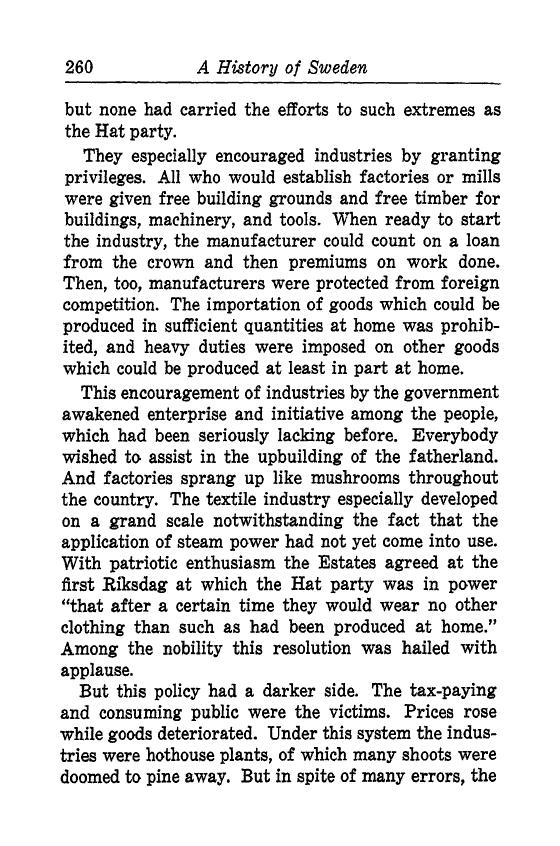
Full resolution (TIFF) - On this page / på denna sida - XIV. Reign of Ulrica Eleonora and Frederick I, 1719–1751 - G. Industrial and Cultural Development

<< prev. page << föreg. sida << >> nästa sida >> next page >>
Below is the raw OCR text
from the above scanned image.
Do you see an error? Proofread the page now!
Här nedan syns maskintolkade texten från faksimilbilden ovan.
Ser du något fel? Korrekturläs sidan nu!
This page has never been proofread. / Denna sida har aldrig korrekturlästs.
260 A History of Sweden
but none had carried the efforts to such extremes as
the Hat party.
They especially encouraged industries by granting
privileges. All who would establish factories or mills
were given free building grounds and free timber for
buildings, machinery, and tools. When ready to start
the industry, the manufacturer could count on a loan
from the crown and then premiums on work done.
Then, too, manufacturers were protected from foreign
competition. The importation of goods which could be
produced in sufficient quantities at home was prohib-
ited, and heavy duties were imposed on other goods
which could be produced at least in part at home.
This encouragement of industries by the government
awakened enterprise and initiative among the people,
which had been seriously lacking before. Everybody
wished to- assist in the upbuilding of the fatherland.
And factories sprang up like mushrooms throughout
the country. The textile industry especially developed
on a grand scale notwithstanding the fact that the
application of steam power had not yet come into use.
With patriotic enthusiasm the Estates agreed at the
first Riksdag at which the Hat party was in power
"that after a certain time they would wear no other
clothing than such as had been produced at home."
Among the nobility this resolution was hailed with
applause.
But this policy had a darker side. The tax-paying
and consuming public were the victims. Prices rose
while goods deteriorated. Under this system the indus-
tries were hothouse plants, of which many shoots were
doomed to pine away. But in spite of many errors, the
<< prev. page << föreg. sida << >> nästa sida >> next page >>